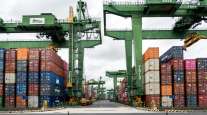Trump Castigates Global Trade Pacts; Lawmakers Caught in a Vice

WASHINGTON — Sens. Charles Grassley, a cantankerous Midwestern conservative, and Tim Kaine, a paint-by-the-numbers East Coast Democrat, don’t agree on very much. But when it comes to free trade, both are very worried.
With Donald Trump castigating global trade pacts from the campaign trail and the United Kingdom’s plan to break with the European Union, lawmakers from export-oriented states are being caught in a vice between business constituents trying to expand business opportunities and intensifying public sentiment that’s transcending borders and seems increasingly sour on globalization.
The tension is being felt in locales like the Virginia port of Hampton Roads, which handled $71.3 billion of business in 2013, fifth-most among all U.S. ports and 12th among all American freight gateway sites, according to Transportation Department data. Halfway across the country, Iowa corn, soybeans and farm machinery depend on Canada, Mexico and overseas markets such as Japan, China and South Korea.
RELATED: Analysis - two experts envision trade under President Trump — goodbye, Wal-Mart
“There’s a lot of interest in my state,” said Grassley, who describes regular visits to his office by those interested in free trade. “It could be agriculture. It could be services. It could be manufacturing. Whether it’s John Deere or Vermeer or 3M … or Principal Financial, it’s very difficult. They’re in support of it.”
The challenge is pushing policies and fashioning a winning message at a time when politicians seem almost cowed at the prospect of promoting expanded trade. Fears of corporate interests wielding outsize interest at the expense of national sovereignty, public health and even freedom of expression are drowning out arguments for lowering protectionist tariffs, harmonizing regulations and facilitating financial transactions. So, too, is the perceived lack of benefits from the North American Free Trade Agreement, or Nafta, the giant trade deal President Clinton pursued that is widely blamed for U.S. job losses.
RELATED: Trucks hauled most Nafta freight by value in July, US DOT reports
“Trade’s going to happen. The real question is: Are we going to continue being part of writing the rules, or are we just going to let others write them?” Kaine says. “I think we should be part of writing the rules. But that means we’ve got to make that case. It’s an easier case to make in Virginia, but we’ve got to make that case nationally, as well.”
The crucible in the short run will be ongoing talks over ratifying the Trans-Pacific Partnership, a multinational trade pact that’s become something of a Rorschach test for both sides’ fears and mutual suspicions. The betting is a lame-duck Congress will have a chance to ratify the deal, which has been energetically pursued by the Obama administration but isn’t likely to be a priority of whomever next occupies the White House.
RELATED: Freight firms cheer Pacific trade deal
Kaine and other free-traders shouldn’t expect many colleagues to rally for the pact. Few bring up the T-word in their stump speeches, meaning voters are largely hearing unfiltered diatribes about negatives of multicountry agreements from candidates such as Trump and former Democratic presidential candidate Bernie Sanders and like-minded populists.
“The reason many candidates are not talking about trade is it’s simply not a winning political issue to support policies that are so unpopular with such a large section of the working class,” said Peter Francia, a political science professor at East Carolina University.
“That said, Trump recognized a way to win many of those voters … by attacking deals like Nafta,” Francia said. “And Senator Sanders has been willing to make those same kind of attacks for the last 20 years.”
Nafta as a crucible Polling firm Gallup regularly has asked U.S. voters whether foreign trade represents an “opportunity for” or a “threat to” the country’s economy for over a decade. A trend line shows opinions varying over the years. Notably, in 2008, as the U.S. and global economies entered a crisis period, those replying “threat to” peaked at 52%. But as the American economy has slowly recovered, most of those surveyed (58% in the poll’s latest incarnation, conducted in February) now view trade as an opportunity.
But when Gallup asked specifically about Nafta and the Trans-Pacific Partnership, Americans were split. In April, 28% of those surveyed said Washington should pull out of those deals, another 28% said America should stay in — and 43% admitted they knew too little to take a position.
The April poll results — and repeated descriptions of international deals from Trump and Sanders like “horrible” and “disastrous” that have been met with thunderous applause from coast to coast — illustrate why trade is arguably the only policy casualty of the current presidential campaign cycle. But experts say they are ready to pounce should the president spend political capital this summer and fall lobbying Congress to approve the TPP after November’s elections.
Trade is a tricky political issue. Perceptions ride on the ripple waves of an increasingly connected global economy, a region’s geographic location, local industries, an area’s ability to export goods and, importantly, a region’s history with international trade agreements. There are reams of data that trade supporters and skeptics cite in making their arguments.
Senate Republican Conference Chairman John Thune, a pro-trade South Dakotan, says trade is merely “in a holding pattern” because “it’s just not a priority at the moment for either of the presidential candidates [and] it doesn’t seem to be a priority for the president.”
But many American voters just aren’t in the mood. They see jobs that vanished post-Nafta and aren’t coming back, as well as trade deals that helped multinational corporations send jobs to countries where costs are lower, to boost their profits.
“Oh, I do,” replied House Democratic Caucus Vice Chairman Joseph Crowley when asked if he hears anti-trade gripes from his constituents. His 14th District in New York sits near the Port of New York and New Jersey, which handled $201.9 billion in total trade in 2013, second among all U.S. ports and also second among all American freight gateway sites, according to the Transportation Department.
“There’s just been a barrage on both sides, from the far left and the far right, in opposition to it,” Crowley said. That assessment was shared by other lawmakers, Republican and Democratic, who were interviewed for this article.




